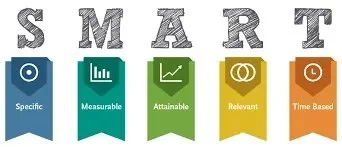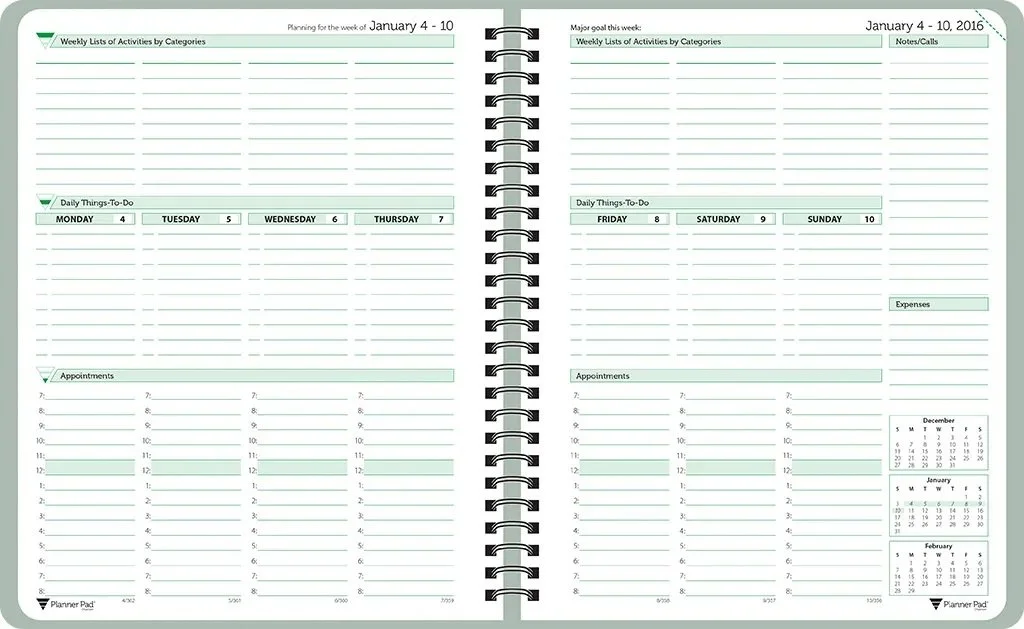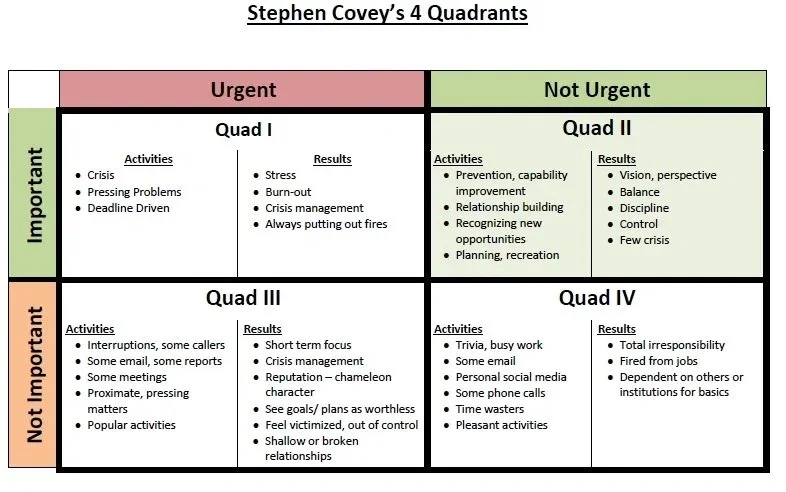Goal Setting Tips
Summary: The use of S.M.A.R.T. goals, basic planning tools, and excellent time management constitutes a perfect combination for effective goal setting. Focusing on large objectives, dividing them into small, measurable steps, and planning daily helps to keep one's attention maintained. The application of the time management matrix supports the choosing of the important but not urgent tasks, which results in real progress.
In this post I highlight the three important aspects of traditional goal setting that I believe needs elaboration:
SMART goal setting,
Using a combination of a paper-based system and online tools, and
Good time management.
S.M.A.R.T.
Start by setting S.M.A.R.T. goals. Goals that are Specific, Measurable, Achievable, Relevant, and Time-bound.
For example, let’s say you want to lose weight. How much weight do you want to lose and by what date?
To lose 15 pounds by July 1st, 2014.
This goal is specific – 15 pounds.
To make it measurable you need to measure your weight now, and then again on July 1st.
Is the goal achievable? This part is subjective, up to each person to assess. This goal requires you to lose a little over 2 pounds per month. This seems achievable to me.
Is this goal relevant? Again this is subjective. Perhaps for medical reasons you need to lose weight that would be highly relevant.
Is the goal time-bound? Yes, by July 1st, 2014.
The key to achieving your big goals is to break them down into achievable steps that can be planned and measured daily or weekly. This goal must be broken down into smaller steps.
For instance, what are you going to do every day, every week, every month to meet this goal? How are you going to change your diet and your exercise? Again make sure these steps are S.M.A.R.T.
Online Tools
I like using a tool called Goal Enforcer to plan my goals. I like this tool because it is visual, working the way the mind does in images and associations.
I also recommend the online collaboration tool Trello or Any.do
Planner Pads
To plan my daily and weekly activities I use Planner Pads. This is a little known system, but I like it very much because it uses a funneling approach to task planning.
At the top I label each column with topics that are relevant for the week like: Personal, Work, Health, etc. In the middle section I add the tasks that I need to accomplish that day, but are not a timed. At the bottom, I put in my all my timed appointments.
Time Management Matrix
Perhaps the most important part of achieving your goals is learning to manage your time. I suggest you get in to the habit of planning all the time: every week, every day and several times a day. If you do not have a discipline of planning you might end up wasting time on activities that are not relevant to your goals.
Stephen Covey in his classic The 7 Habits of Highly Effective People introduced a time-management matrix.
Quadrant 1 contains tasks that are urgent and important like paying bills.
Quadrant 2 contains tasks that are non-urgent and important like budgeting.
Quadrant 3 contains tasks that are urgent and not important like reading emails from strangers.
Quadrant 4 contains tasks that are non-urgent and not important like watching TV, and goofing off on the internet.
Effective time management is the key to achieving your goals. When you are not disciplined in your time-management you could be spending too much time in Quadrant 3 and 4, the not-important tasks. In this day and age, I find people bounce between quadrant 1, putting out fires all day, and quadrant 4 vegging in front of the TV or computer doing mindless activities to recover from the chaos.
The goal of this time-management system is to spend time in quadrant 2 – non-urgent and important. This quadrant contains most of your goals.
Besides the obvious – stop spending so much time in quadrant 4 – I find people get hung up on the urgent tasks. They end up doing urgent tasks that should be or could done by someone else. Delegate these tasks to make room Quadrant 2.
My advice is to pay careful attention to the so called urgent tasks. Is it really urgent? And must it be completed by you?
About the Author, Dr Bren:
Dr. Bren Hudson is a holistic psychotherapist, life coach, and couples counselor specializing in Jungian depth psychology and spiritual transformation. With a PhD in Depth Psychology from Pacifica Graduate Institute, she integrates Jungian analysis, Psychosynthesis, and somatic practices to help clients uncover unconscious patterns, heal trauma, and foster authentic self-expression. Her extensive training includes certifications in Internal Family Systems (IFS), Emotionally Focused Therapy (EFT), HeartMath, Reiki, and the Enneagram, as well as studies in archetypal astrology and the Gene Keys. Formerly a corporate consultant, Dr. Bren now offers online sessions to individuals and couples worldwide, guiding them through personalized journeys of healing and self-discovery.
Connect with Dr. Bren:
FAQ's
1. What are the reasons behind the effectiveness of S.M.A.R.T. goals?
They eliminate uncertainty. The goals that are very clear indicate precisely what the person is working for and also how success is to be measured, thus it is easier to keep oneself motivated and on the right path.
2. Why is it necessary to break down big goals into smaller steps?
The smaller steps seem to be good and do not confuse. Daily or weekly actions provide the energy and make the long-term goals possible.
3. Is it really necessary for me to have both paper and digital tools?
Not a must, but it is good to have. The paper planners help to concentrate and think, while the digital tools make it easier to arrange, monitor, and cooperate.
4. What is the main error that people often commit regarding time management?
They allocate too much time to the urgent but unimportant tasks. Consequently, they have little energy left for the meaningful activities that actually advance the objectives.
5. What is the significance of Quadrant 2?
The activities that lead to long-term success are situated in Quadrant 2. These activities are not urgent, but they are crucial for development, well-being, and goal accomplishment.
Need Help? Contact Dr Bren
Animate your Soul for Life!
Send me a message right now to get started on your soulful journey. Together, we will create a coaching plan that is unique and perfect for you.
DR BREN | Buddhist and Jungian Psychology
207 Wendover Ln, Durham, NC 27713, United States
Mobile +1 919-407-0999
Email Bren@drbren.com





